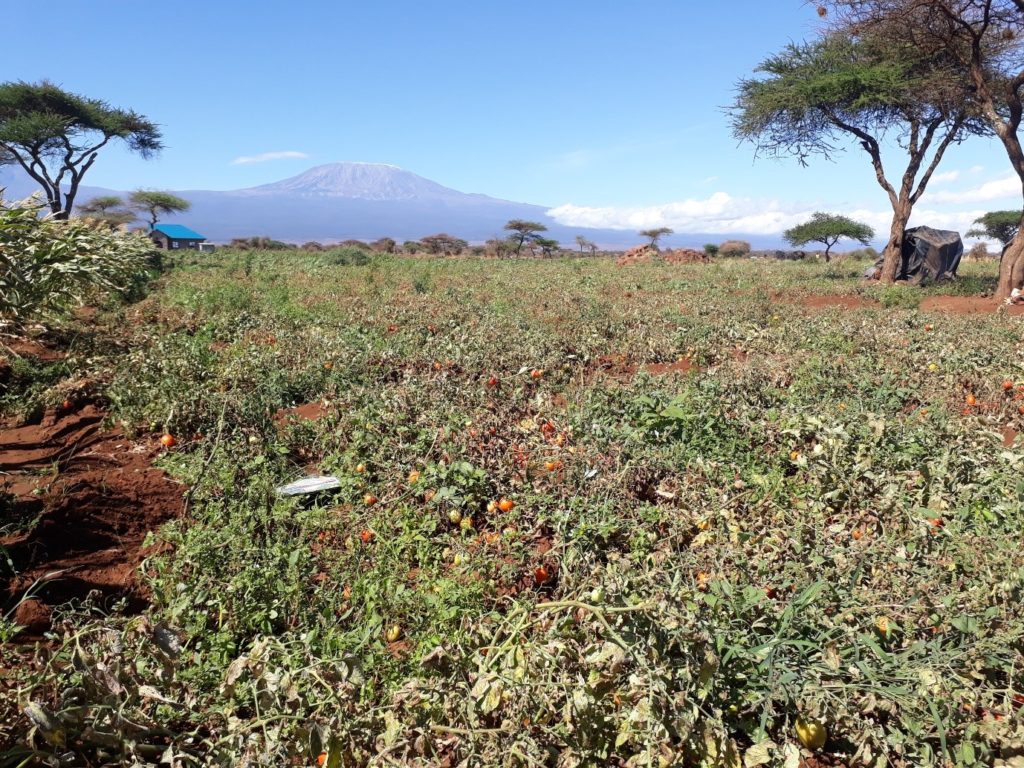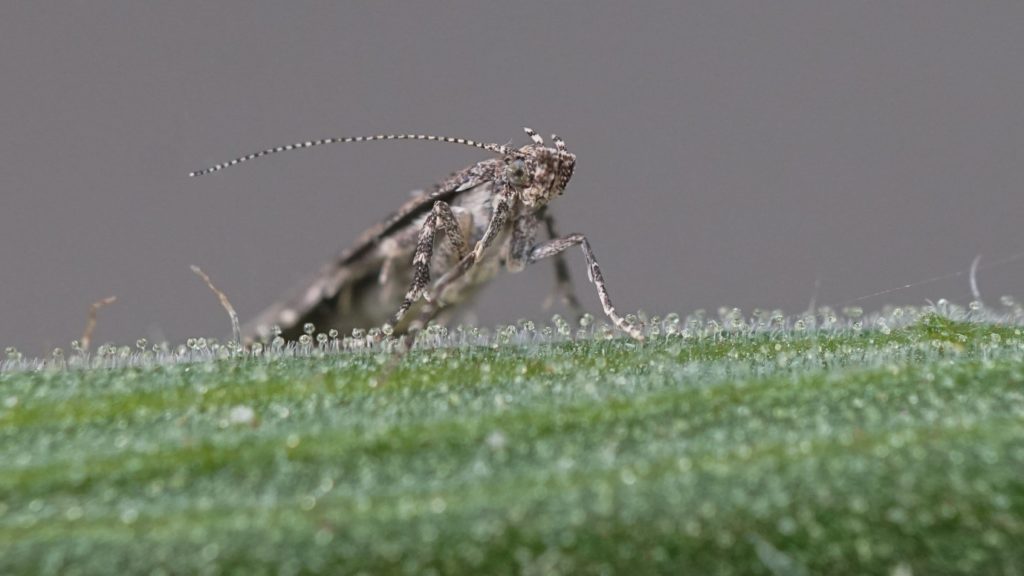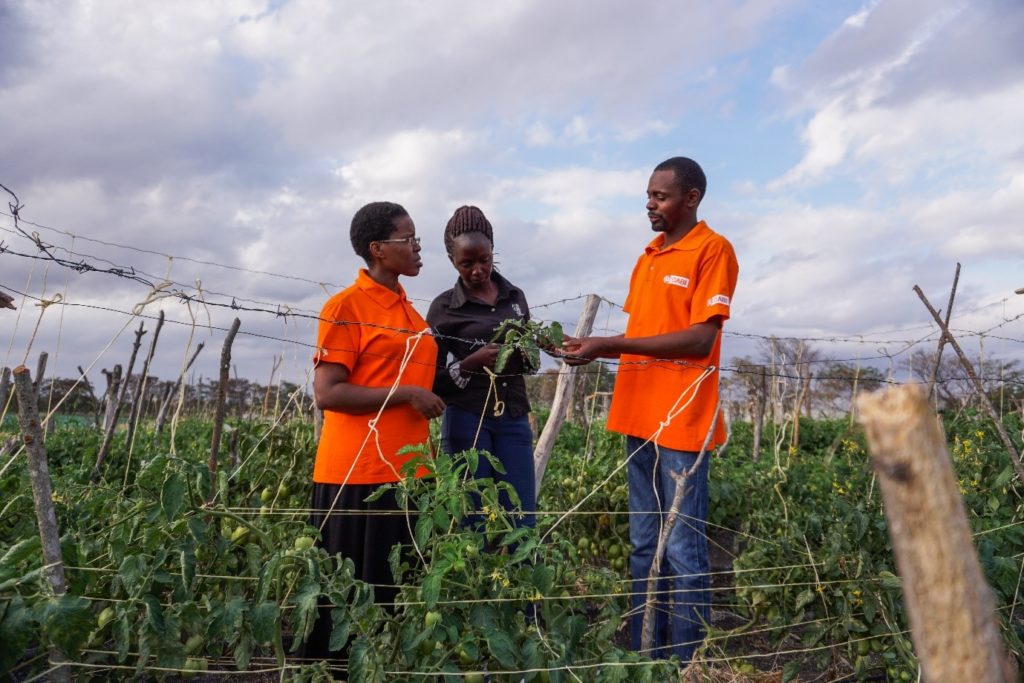
Oloitoktok is a small border town at Kajiado County near to the border of Kenya with Tanzania. This area is most renowned for high tomato production in Kenya, attributed to the suitable climate and availability of water that enables year-round production. Visitors to this area get rewarded with amazing views of the snow-capped peak of Mt Kilimanjaro. However, this scenic view conspires to mask the challenges tomato farmers are facing on a daily basis for the sustainable production of this crop. Since its invasion to the area in 2014, the tomato leafminer, Tuta absoluta, has wreaked havoc to tomato production in the areas and is responsible for causing between 50-80% yield loss.
A CABI study on farmers’ coping strategies towards the tomato leaf miner in Kenya showed that 96.5% of farmers applied pesticides. Of these, an average of 51% applied between one and five sprays/season and 27% applied between six and ten sprays/season to contain this pest). According to James Mutesia, a tomato farmer at Oloitoktok, some farmers are known to apply up to 12 sprays during the 3-month cropping cycle, a practice that usually follows a spraying program rather than a pest management decision made through monitoring.
Mutesia adds, “The pest spreads very fast and if you don’t spray, you may not harvest anything. So, we start spraying two weeks after transplanting whether there is Tuta or not”. This practice is likely to lead to pesticide resistance, and this might explain one finding from the same CABI study that showed that only 27% of farmers thought pesticide treatments to be successful. Further, some farmers don’t observe pre-harvest intervals, thus toxic substances are likely to enter into the human food chain posing long-term health risks to consumers.

Therefore, CABI in partnership with Koppert Biological Systems, in a bid to reverse this trend, have initiated a new project “Demonstrating biological approaches for sustainable management of tomato leaf miner in Kenya”. With funding from the Netherlands Ministry of Agriculture, Nature and Food Quality (MinLNV), this project aims to contribute to the sustainable management of tomato leaf miner in Kenya through adoption of integrated biological approaches by smallholder farmers.
The use of biological control is an important component in the Integrated Pest Management (IPM) of Tuta absoluta. It can offer a safer, cost effective and environmentally friendly control option to the smallholder farmer. It also represents a business opportunity for the private sector engaged in the production of biological control products. Koppert products, such as the predatory mirid Macrolophus pygmaeus (MIRICAL) and the pheromone trap (Tutasan), have been shown in experimental conditions to result in a 95% reduction in pesticide use, and a 133% yield benefit over conventional farmer practices.
However, a recent study by CABI in Kenya on smallholder farmers’ attitudes to biological pest management shows that they perceive biological options to be expensive, often not available, and not always as effective as synthetic pesticides. The study showed that there was limited awareness of biopesticides amongst farmers: e.g. only 29%, 16% and 13% of farmers had heard of Azadirachtin, Bacillus thuringiensis and Beauveria bassiana, respectively, and 78% reported that such products were not readily available.

To address such perception issues, this project, will enable farmers to pilot IPM approaches using known biological control products. Farmer field days will be held to allow for farmer own assessment of the effectiveness of various technologies and their benefits. Analysis of benefits and costs associated with the two IPM approaches in comparison to conventional pest management will also be conducted, which will enable farmers’ decision making on uptake of alternative and safer pest management practices. This will ultimately provide lessons and evidence for furthering the uptake of biological control in Kajiado County, and scaling up to other parts of Kenya.
The longer-term strategy is that farmers who adopt biological control will start to see the need to preserve natural enemies, use less pesticides and consequently stimulate demand for more biocontrol products. This will also create a lasting impact on the livelihoods of the communities growing tomato in Kenya.
Additional information
Project webpage: Demonstrating biological approaches for sustainable management of tomato leaf miner in Kenya
